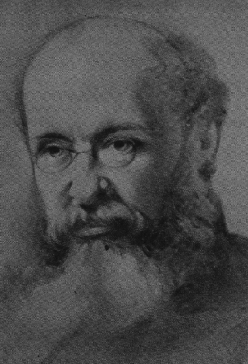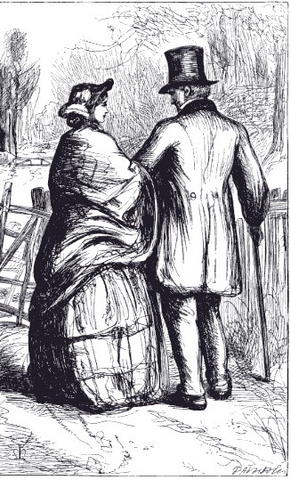Ellen and Jim Have a Blog, Too
We are two part-time academics. Ellen teaches in the English department and Jim in the IT program at George Mason University.


Trollope and Gender: the papers (1) · 27 July 06
Dear Marianne,
This was the first conference to be held just about Anthony Trollope in 25 years.
Samuel Lawrence, Anthony Trollope, 1864
Probably how different was the composition of the people attending then. This time the women outnumbered the men 4 to 1; there were as many people from the US as UK; there were many young people, some of whom had never given a paper at a conference before, and there were many inbetween and older established scholars; there were general Victorianists and people who really were deeply engaged with Trollope.
For me the great pleasure of the conference was meeting Nick H and Clare S, two members of Trollope-l. I also made contact with many Trollope scholars, young and old. I won’t write about this except to say that while among the academics at the conference (there were numerous ordinary readers who sported a tag which said "Independent Scholar") there was clearly a pecking order arising from the rank and publication history of the individual, nonetheless, there was remarkably little overt politicking and much genuine egalitarian congeniality and friendliness. We did Trollope proud.
The drawback was the intense heat. The University of Exeter is high on a hill, and what a climb I had each day getting to the Peter Chalk conference center. This center had not one fan, let along anything resembling air-conditioning. Yet there were no windows in several of the rooms, and to get any refreshing air into 2 of the 2 rooms given over to the conference, people opened the outside doors.
From Monday around noon to 5, Tuesday from 9 am to 4:30 pm, and again Wednesday from 9 am to around one in the hot afternoon I listened to papers and at one point gave one myself.
Herewith follows an attempt to summarize the best papers I heard and to describe briefly the rest (including some I didn’t hear but were described in the "Programme and Abstracts").
I was that nervous about giving a paper myself on Trollope to a mostly academic audience that I lost my notes for the first day, and forgot to bring my steno pad for the second. When I was finally prepared properly and calm on the third day, there were only two panels on and (of course) in direct conflict, after which came the final roundtable (6 people spoke for 5 minutes each) where we were to discuss Why read Trollope today?, and How persuade adminstrators and such like business people that courses should be given on Trollope’s writing?
For this letter I’ll just cover what I heard on the first Monday afternoon.
The first key note address (2:00 pm) the most enjoyable and stimulating of the whole conference (that I got to hear). Robert Polhemus talked about "older-men-younger-women, father-daughter relationships in Trollope." He began by retelling the Lot story from the Bible, and suggested that in Trollope we find many older men fostering the identity and sexuality and fulfilled futures of younger women. The older men may play a father, brother, or companionate, or implicitly sexual partner role (apparently heterosexual) to the younger women. From "A Ride Across Palestine", Prof Polhemus made visible the fluid and subversive sexuality of the older male narrator and younger woman dressed as a male who travels with the narrator; he argued that "Mary Gresley" was a reverse Jane Eyre: we see the cruelty of the demand the heroine destroy her manuscript to please the male ego of her bethrothed, and how when she goes out to a missionary place with her rigid clergyman-husband, she dies. He quoted allusions to Currer Bell in "Mary Gresley."
J.E. Millais, "Judge Staveley and His Daughter," Orley Farm
There followed two sets of two panels run at the same time, with one panel directly after the other.
I chose first to go to "Dissonant Feminities I" (3-4:30 pm) where I heard Clare Bainbridge’s informative and illuminating paper on the regency silver-fork novels and Trollope’s fiction. She focused on The Way We Live Now (which along with He Knew He Was Right) appears to have replaced The Last Chronicle of Barset as the very long novel all living Trollopians must know. Elements which puzzle us in Trollope are to be explained by his having taken them over from his extensive reading in the drama from the 1520s to his early manhood (mid-19th century). Ms Bainbridge (an independent scholar) made me want to read Catherine Gore’s The Banker’s Wife (1834). A second paper from this panel I liked very much was on The American Senator. Karen Kurt Teal used paradigms from l’ecriture-femme to reveal how the novel seems to buy into conservative values while undermining them, and suggested we are to admire and sympathize with Arabella Trefoil who "risks and performs transgressive acts to save herself." I’m not sure Trollope’s text is as sympathetic towards Arabella as Dr Teal thought, but do recall that Catherine C (from Trollope-l) used to write here and she took Arabella as her pseudonym. This suggests some readers find in Trollope’s texts much empathetic rebellion, rage, and exposure of what life is for a woman in a society where her self-respect and safety must be found in a rich husband.
I regretted having to miss the panel on at the same time called "Dangerous Liaisons: Family Sagas." Dr Lynn Parker’s paper was on predatory brothers in Phineas Finn and Can You Forgve Her? I’d say there are many predatory and "protective" brothers in Trollope’s fiction. Brothers bully and terrorize their sisters and other female family members to control their sexuality in novels like The Macdermots of Ballycloran (here the brother is a decent man and is murdered by the state as a scapegoat). I also missed Dr Christine Poulson’s "Remarriage and the Stepfamily in Trollope’s fiction." The abstract shows she focused on the stigmatizing women had to endure who married for a second time (they were oversexed?) and the kinds of conflicts that emerged between the children of a family and a non-biological mother in a world where money and place and safety are rooted in family relationships. (I regretted missing hers because I do have her wonderful art book, The Quest for the Grail: Arthurian Legend i British Art 1840-1920. Prof Jenny Bourne Taylor showed how possible illegitimacy in Trollope’s novels (Ralph the Heir, Lady Anna, Is He Popenjoy?, and Mr Scarborough) functions to expose what were people’s real behaviors and motives inside ambiguous families and also shows Trollope’s own contradictory attitudes.
I was attracted to the supposed theme of the first panel (the buzz words "dissonant feminities"); I would have done better to read the abstracts and remember my own reading of Trollope’s novels which the latter panel’s papers would have enriched.
For the second set of panels (5-6:30 pm) I went to "Cultural Markings of Gender" where I heard Dr Sigi Jottkandt’s paper on how Trollope focuses on male beauty in his novels, Dr Galia Ofek’s paper on Trollope’s ambivalent attitude towards dirt and false hair (she argued that these alienate yet sexually arouse Trollope’s narrator), and Prof Rebecca Resinski’s paper on Trollope’s use of classical (meaning from Latin literature) allusions in his novels. Prof Resinski is a scholar in classical studies whose etext project, Trollope’s Apollo, with her students where they outlined and detail the classical references in the Barsetshire novels I’ve put on my website.
On against these were papers attached to a panel called "It’s a Boy Thing: Emerging Manhood." Prof Steven Amarnick gave another paper comparing the present bowdlerized or much truncated text for the Duke’s Children that we read today compared to the original and much longer text (about a volume longer). I heard him give a previous one comparing the two texts at the New York Trollope society about 2 years ago where it became apparent the original longer text is much darker, more complex, presents Lady Glen and Mrs Finn more subversively and darkens Frank Tregear while allowing the heroine, Mary, to marry him, and contains an ironic ending. I summarized this paper at the time and my summary is in the archives of Trollope-l online at Yahoo. Perhaps I should put this summary somewhere on my site (under the group reads). Steven told me it is now looking as if it’s possible he could do an edition of this real full text of The Duke’s Children. I look forward to it.
There were two papers on the hobbledehoy figure (e.g., Johnny Eames, Tom Tringle, Charley Tudor) in Trollope’s fiction. As this type is central and frequent in Trollope’s fiction and provides a key to Trollope’s understanding and presentation of manliness, masculinity, and sympathetic identification with a masculinistic point of view, the patriarchical ordering of our society, and misogynistic conceptions of some female types I realized afterwards I should probably have gone to them. I do disagree with Dr Hyson Cooper’s point of view thoroughly and do not see the presentation of male types in Ayala’s Angel as simply restrictive or unnatural, and will be telling you about this when I put my paper, "Trollope’s Comfort Romances" on line and describing it here further.
Then there was tea, wine, and refreshments. Clare was kind enough to drive me down the hill so I could make a train back to Lympstone quickly. Edward was waiting for me on the platform. We had a good meal, went to a pub and drank and mingled with the local people a bit, walked along the beach, and wandered in the village up to the old church and back again alongside the cliffs, and, then, to bed.

Peters Tower, sunset at low tide, Lympstone Village, Devonshire
More on Saturday night,
Elinor
--
Posted by: Ellen
* * *
Comment
- From Clare:
"I agree with you about the conference. I really enjoyed it, but managed to miss some of the best panels …
Clare"
— Elinor Jul 28, 4:48pm # - From Kathy C:
"I just read your blog entry on the Trollope conference. Very inspiring. I truly found it fascinating … Maybe one day I’ll attend the Trollope Society meeting in NY.
I must read another Trollope this summer. The last I read was Lady Anna, which I found rather insipid. The American Senator is one of my favorites: the paper you heard sounds fascinating.
Kathy"
— Elinor Jul 28, 11:58pm # - Dear Kathy,
Have you tried The Bertrams. I recommend it. One of the chapters in my book, Trollope on the Net is about Lady Anna: you'll find that the participants in the conversation the read book passionately.
E.
— Elinor Jul 29, 12:13am #
commenting closed for this article


